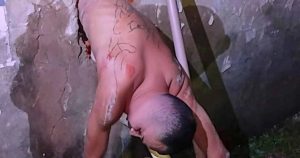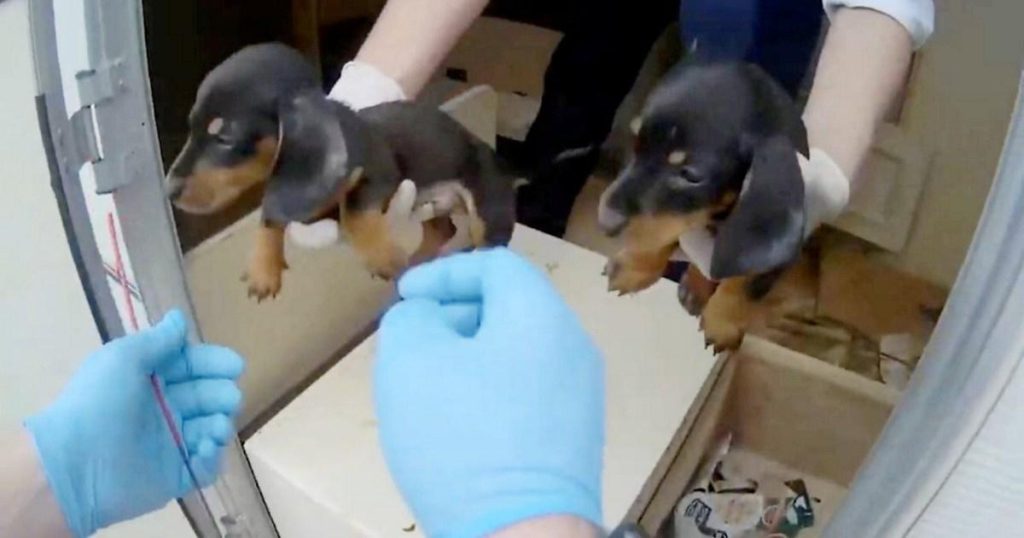Micaela Anderson-Letts, a 35-year-old mother, has been found guilty of orchestrating an international puppy smuggling ring and subjecting dozens of puppies to deplorable conditions. The operation involved importing puppies from European countries like Poland and France, often using falsified animal passports, thereby posing a significant risk of introducing rabies into the UK. The puppies were frequently housed in squalid environments, including an abandoned caravan in Eastbourne where numerous dogs were discovered living amidst their own waste, forced to resort to cannibalism for survival. Anderson-Letts’s disregard for animal welfare extended to other animals under her care. Pigs, chickens, and hens at her Surbiton residence were left to compete for scarce resources, enduring injuries, starvation, and dehydration, particularly during the intense heat of the first national COVID-19 lockdown. The remains of these pigs were sometimes fed to the smuggled puppies.
The scope of Anderson-Letts’s illegal activities was extensive. Police investigations unearthed thousands of pounds in cash, receipts, and forged documents, revealing a sophisticated and highly organized operation focused solely on profit. She advertised the puppies online, collected payments, and traveled throughout the UK, reaching as far as Aberdeen, to conduct her illicit business. Estimates suggest she stood to gain over £173,000 from the sale of these undocumented animals. The conditions these puppies endured were horrific. Upon discovery, the animals were found suffering from various infections and infestations. One puppy rescued from the Eastbourne caravan tragically succumbed to starvation. The neglect and abuse inflicted upon these animals exposed the callous nature of the smuggling operation.
The discovery of the abandoned caravan in Eastbourne in 2021 provided stark evidence of Anderson-Letts’s cruelty. Despite a pre-existing ban on keeping animals, she had crammed 35 puppies – Labradors, Dachshunds, and French Bulldogs – into the squalid space. The interior of the caravan was a scene of utter neglect, with faeces and urine-soaked cardboard covering the floor. Exposed wires, nails, screws, broken wood, and tools posed further dangers to the vulnerable animals. The desperate state of the puppies was evident in their frantic consumption of water provided by rescuers, highlighting the severe dehydration they had suffered. A veterinarian on the scene confirmed the animals’ suffering and their seizure under the Animal Welfare Act.
Despite CCTV footage placing her vehicle at the scene, Anderson-Letts initially denied any connection to the abandoned caravan. However, the overwhelming evidence presented at Kingston Crown Court led to her conviction. Judge Marcus Tregilgas-Davey characterized Anderson-Letts as a proven liar who had disregarded and misled authorities regarding the care of her animals. He underscored her central role in the well-structured criminal enterprise, emphasizing her involvement in advertising, financial transactions, and the overall organization of the smuggling ring. The judge further highlighted the severe risk her activities posed to the UK’s rabies-free status, a threat that extended to farmers, pet owners, and the wider public health.
While acknowledging the seriousness of the offenses, the judge handed down a 24-month suspended sentence, citing the mitigating factor of Anderson-Letts’s one-year-old daughter. This leniency sparked debate, with some arguing that the gravity of the crimes warranted a custodial sentence. In addition to the suspended sentence, Anderson-Letts received an indefinite ban on keeping animals and was ordered to perform 300 hours of unpaid work. The case stands as a stark reminder of the brutal realities of the illegal pet trade, where profit motives supersede animal welfare, and the potential consequences extend far beyond the suffering of individual animals. The exploitation and neglect endured by these puppies underscored the urgent need for stricter regulations and enforcement to combat this cruel trade.
The story of Micaela Anderson-Letts and her involvement in the international puppy smuggling ring is a disturbing example of animal cruelty driven by greed. Her actions not only caused immense suffering to dozens of puppies but also posed a significant threat to public health. The case highlights the importance of continued vigilance and robust legal frameworks to protect animals from exploitation and ensure the responsible breeding and trade of pets. The suspended sentence, while controversial, allows for ongoing monitoring of Anderson-Letts and reinforces the message that animal cruelty will not be tolerated. The ongoing legal proceedings and public scrutiny will hopefully contribute to raising awareness and strengthening efforts to combat the illegal pet trade.




